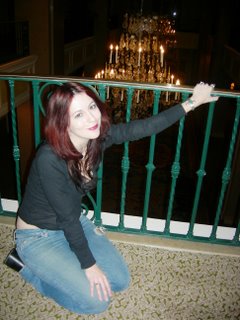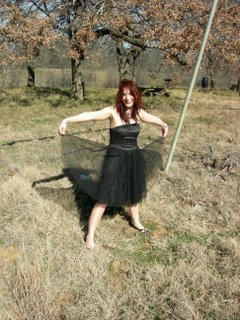
Here's some Sunday fiction. This story was first published in
Hayden's Ferry Review.You Either Have It Or You Don't
I'm sitting at my desk, trying to spell "surprise." I think I've got it right, but the longer I look at it, the more wrong it seems. Instead of being the receptionist this morning, I have to take pictures and write a story about our center, a non-profit, church-owned social work outreach program on the eastside of Detroit. Each year, every center turns in a story that the head branch pieces together for a booklet called A Day in the Life. I got the assignment because nobody else has the time or desire, and I'm considered a writer, because I'm working on a thesis in English, documenting examples of the process by which people make entire stories about secondary characters or plot pieces of larger narratives, like John Gardner's
Grendel. Like everything else, it seemed like a good idea at the time. But now that I've moved two thousand miles away from my university and haven't so much as looked at a book on my subject since I got here three months ago, I'm not so sure.
"Hey, do something useful. I need a picture," I say to the bookkeeper, thinking about how photography was another degree I'd tried and not finished.
"United Way: people helping people," he says in an over-sincere announcer voice, then makes to put the petty cash in his wallet.
He's not too bad. I call him Tandy Boy because he uses the only computer in the office, an antiquated PC years behind most office technology. Before I started working here, he was the only one in the office who knew how to use any computer. The rest of the social workers type everything on ancient IBM Selectrics. I've learned how to load correctable tape. We aren't allowed to use Liquid Paper because our boss says that shows we saw the error, but it doesn't make it look better. This is the non-profit, social work equivalent of "we were poor, but we were always clean."
Tandy Boy and I work on the second floor with all the main offices: home health services, drug counselling, medication vouchers for the elderly and low-income. Directly below us is an adult day care center that specializes in dementia patients. Near the end of the day, I lean over the balcony feeling like Olivia de Haviland in The Snake Pit and watch the clients sit and watch television, some days Sesame Street, yesterday some political funeral on CNN.
"So, have you decided what you're going to write about?" he asks.
"I can't even spell today, much less write."
He interrupts. "Take a picture of Dolores. I'm supposed to unplug her toilet today if she'll let me in."
In addition to keeping the books, Tandy Boy works chore service, and today he must see Dolores Pringle, a notorious repeat recipient of said service, a middle-aged schizophrenic with long black hair, pale skin, and a voice that drops from normal to registers best described as spooky in a matter of seconds. Once she came in for a medication voucher and saw me. She walked by my desk and in the most certain of tones said, "I don't like the way you look. You never know what's going to happen," and I thought, Finally, someone who knows me.
Sometimes what you leave behind is as telling as what you take. When I moved here three months ago, I didn't want to pack much. Instead, I gave almost all of my possessions away. It was a variation on my favorite childhood game: pretending I was dying and making lists of my toys and who would get them when I was gone. My mother never made that kind of list even when it was clear she needed to.
That was nine months ago, so my boyfriend Stephen never met her. He hasn't met my father, either, a man I've seen with increasing irregularity for the last nineteen years. I started dating Stephen four months before he was scheduled to graduate and move to Detroit to start his new job as chairman of an English department at a frou-frou prep school in Grosse Pointe. It's a long way from Texas, where we met and where I've lived my entire life.
On our first date, we went to the movies. We were there at the perfect time for only one showing, a movie in which Kevin Costner delivers mail after a massive nuclear war, restoring faith in America. My first thought was, Everyone's dead or maimed and you're still getting your Discover bill and this is supposed to make you feel better?
But after it was over, he said, "Boy, if we can make it through that movie, we can make it through anything."
There's a rebellion of sorts downstairs after Tandy Boy leaves. One of the men, Bill, beats a table with his cane because a program aide spelled macaroni incorrectly. He's yelling,
"Goddamnit, I've lived ninety-five years, I know how to spell macaroni and that's not it, black girl."
In the background, Frank Sinatra sings "Witchcraft" and two women wander about, both clutching dolls. Many of the patients downstairs have dolls they take care of and give names to, words that aren't really names, like Sweetheart and Baby. For some of the patients, the dolls are more real than the program aides who take care of them. There is a Tibetan word for this, a word I can't remember, for the belief that objects can be animated by living people.
I hear someone crying, saying, "My baby. She's dead."
"That's okay, she's just sleeping. Your daughter's gonna be here in a minute," one of the program aides says.
Bill continues to beat away with his cane.
"What's going on down there?" asks one of the social workers, a thirty-something anorexic with honey-blonde hair down to her waist.
"Semantics discussion," I say.
Since I've arrived here, I have gotten almost as thin as she is, but it's not the same. I start to eat, but get distracted and nervous and the food turns cold. I can't force it down. My lack of appetite is a failure of will, not a triumph.
This woman with her beautiful hair will say, "God, I'm so hungry, but I don't know what I want." She'll pace around the food at office parties, eating the tops off cupcakes, then throwing the rest in the trash when she thinks no one is looking.
There was one other time I became thin enough to be worried. My mother took me to her doctor who talked to me for a long time. I don't remember what I said, only that I convinced him I was happy and healthy without a care in the world.
"She does these cartwheels and handstands all over the house," my mother said. "I can just see the calories fly off her."
My mother was trying to diet at this time herself because the thyroid medication left her metabolism sluggish. Radiation implants buried deep inside her, she'd recovered enough to worry about the way she looked.
"Do me a favor, okay? Teach your mother to do cartwheels," the doctor said on our way out the door.
Trying to get away from the phones and noise long enough to write, I lock myself in the student intern office. Like everything else here, I feel like I'm stepping back in time twenty years. Even the books in this office are from the seventies. There's some illustrated children's books: Free to Be You and Me and You Have the Right, stories about kids breaking through gender lines and becoming self-actualized. And there's an old textbook I've looked through to kill time called Deviancy and Social Behavior with studies about religious cults and specialized populations, like prisoners of war and EST participants.
When I set all of my notes in front of me, I feel like I've pulled out everything in my closet, and I don't have the energy to figure out how it all fits together. Dementia patients watching Wishbone, a show about the adventures of a talking dog. Medication vouchers for oncology drugs so expensive I would have to save a month's worth of paychecks for a refill. I don't know where to start. It's this feeling of being overwhelmed that makes me get rid of things. My boyfriend is the opposite. He saves everything, but has none of the necessities. When I offered him a frying pan once, he was aghast, saying, "I'll never use that," as if I were trying to give him heart-shaped muffin tins or corn-cob skewers. Once upon a time, this lack of commitment to the things of this world would have seemed to me a bad sign.
But graduate school changed me. I stopped wanting traditional arrangements, including the one I had. In graduate school, we had basement offices with no windows, completely sealed from the rest of the world. This office is not so different. Second floor, but still no windows, no suggestion of the outside.
Even so, it's not the worst work I've ever done. People here have a sense of perspective lacking in the university. One of my first days here I stayed on my knees for the good part of eight hours, filing in bottom cabinets. An older women with a cigarette-ruined voice looked at me and said, "Honey, you're not supposed to get on your knees for anyone but your boyfriend or your husband."
And I mean, really, how can you argue with that?
The longer I spend not writing my thesis, the more I think about this: you have two jobs in life -- to do what you have to do and to explain why you are doing it. The easier the first part is, the harder the explanation. Nobody asks you to justify being a heart surgeon, but a receptionist? I think by not writing my thesis, I am defining myself, much the same way people who don't drink anymore want to call themselves alcoholics.
My whole life is like this in some ways. When friends from home ask if I'm meeting people, I say yes, which is true, but not the answer to the question they mean to ask. I don't want to meet people; I know some already. The difficulties of explaining behavior, personality, the whole why I do what I do, it's just not something I want to think about here. But I do think about a job I was offered before I moved, a tech writing job that offered a lot more money than I've ever made, a nice-sized office instead of a cubicle, and something I could say I did at the end of the day when I went home. It was more tempting than I've confessed.
In the middle of the afternoon, we get a person to come in and help, someone we refer to somewhat oxymoronically as a court-ordered community service volunteer. This young man shows up in a pair of long cut-offs, a shirt that says "Mudhoney" and bulky socks that don’t quite hide the tether strapped to his ankle. The first thing he asks is, "What's the ordeal here?" and it's my job to manage his time for the afternoon because my boss is away attending a meeting at the downtown office.
We get lots of court-ordered community service volunteers, about one a month. The question we always ask is, Why are you here, followed by, How much time do you have to do? I've been asked the same questions, more subtly, and I envy the volunteers their direct answers, the way they know what they did and how much time they will spend before they wipe the slate clean. Today's volunteer possessed ten ounces of marijuana and was caught driving under the influence. He has twenty-eight days before he's free. I take out the list my boss left concerning his duties, reach into the supply closet. I hand him a toilet scrubber and some Comet. I direct him to his task.
"It's my thirtieth birthday today," he says. "I didn't think it would be like this."
Last week was my twenty-seventh birthday. Two weeks ago my ex-husband called to tell me he was getting married on my birthday to a girl he met in a conversational English class six months ago, the kind of class structured so that native speakers could learn a foreign language while speaking English with non-native speakers.
When I got off the phone, Stephen asked me who it was.
"My ex-husband is getting married to his Thai sweetheart at a Buddhist retreat outside of Denton on my birthday and wants to know if we want an invitation."
"You'll come over to my side about not having a phone," he said.
I called my best friend and told her about it. I knew she would understand because her ex-fiancé Jim had e-mailed her on her birthday to tell her he was getting married.
"I thought Jim was about as low as you could go," she said. "The crown passes."
"It was the day the Thai calendar ordained," I said, repeating my ex's tentative explanation for the hostility of the date.
"He said that? So where is he marrying his war-bride, his Saigon bar girl, his Gary Snyder fantasy?"
I told her it was the same Buddhist retreat where our friend Andy Furlow had gone to dry out. Andy couldn't afford rehab so he decided that two weeks with only vegetarian meals and meditating might set him right. He lasted a day before he and everybody else at the retreat thought that he definitely should have a drink and that his not drinking only made everybody suffer. As for myself, if I gave up drinking now, I'd be forfeiting a major source of calories. When I go to the store, I think of mixers as a way of getting vitamins orange juice with calcium for screwdrivers (early precaution against osteoporosis), limes and lemons for gin and tonics (a sure cure for scurvy), and cranberry juice to mix with vodka (that time-honored preventative for the dreaded urinary tract infection).
As for my birthday, I got what I wanted.
I'd hinted that what I really needed was a good medical reference book, and Stephen didn't ask why, he just bought one. I looked up the final cancer my mother had, uterine, a second time around with that particular kind, and the operation she'd had. The book reads, "Total exoneration involves removal of all pelvic organs. Instruct the patient about postoperative procedures: I.V. therapy, central venous pressure catheter, blood drainage system, and an unsutured perineal wound with gauze packing. Make sure the patient understands that her vagina will be removed."
I put the book down and didn't read anything else for the rest of the day.
Once my mother bought me a make-up kit for my birthday. The lipstick didn't match my skin tone. But there was another lipstick in the packet designed to change the shade of what you were wearing if you didn't like it. The lesson seemed to be that everything is salvageable if you put in the effort.
In the afternoon, Tandy Boy returns from his chore and sits at the computer, downloading Star Wars files from the Internet. Without the boss here, things are slow so we make up names for Barbie Dolls based on our clientele. Senior Citizen Barbie says, "If I could do it myself, I would." Court-Ordered Community Service Ken says, "It wasn't my gun in the car; it was my son's, but the fucked-up part is that the police can nail you on that just like it was your own." Tandy Boy's favorite: Psycho Barbie and Walked-On Ken. Psycho Barbie says things like, "Does this dress make me look fat?" and "Let's just be friends." Walked-On Ken has only one line: "Yes, Dear."
I forgive Tandy Boy his slight misogyny which I attribute to what I call his "gay no more" classes. He's in therapy to become a practicing heterosexual, or perhaps more accurately, to remain a non-practicing homosexual. But when we had to throw a breakfast for the office and he said, "Not many people like kiwi, but you need it on the fruit tray for color," I told him that he might want to step up his classes to twice a week.
"Are you going to the circus?" Tandy Boy asks.
"Hadn't thought about it. Not much into the big top, I'm afraid."
"It's going to be cool because there's going to be that family of trapeze artists that died here all those years ago and they're trying the same trick without a net," he says.
I know of that which Tandy Boy speaks. The Wallenda family. They interested me because I read an interview with them last week and one of them said, speaking for the second and third generations that would be performing this terrifying human pyramid on the high wire, that all their life was just spending time waiting for the next performance. The person claimed that everything else was just killing time. And I think now that maybe it's time for me to do the same, make a commitment. Take a leap.
When I want to cry and can't, I think about my mother as a child riding in my grandfather's pick-up truck, her teeth full of cavities. Every week she went with him to get gas because the filling station attendant would give her a handful of hard gum, something she desperately looked forward to even though the gum made her teeth ache, the sweetness inseparable from the pain. Looking back, she'd say, "I loved it even though it hurt," and I think I'm starting to know what she meant.
On my way home, I see a billboard for Chivas Regal, with the caption "You Either Have It Or You Don't." The picture displays a man and woman at a party, done in what I call "Harlem Renaissance" style. Of course, I never see anybody in this neighborhood who looks like they're having this much fun.
What I do see driving home are a bunch of stores charging too much for things people don't really need, words on a burnt-out theater marquee announcing community events like open houses at various parochial schools, and the Thomas Jefferson branch of the Detroit Public Library system.
Reading is one of the things that marks time for me here. The library sits only two blocks from where I live, and if the neighborhood was safer, I could walk. As it is, I drive and stay for hours, looking at books I'd never think twice about anywhere else. Most of the material is outdated -- first aid books from the sixties, old books about photography and psychology and weird sports stuff like You Too Can Canoe. Five copies of the Billie Holiday biography. Surprised by how much I liked that one, I finished it all in one sitting.
Sometimes I check the books out. Once when I was getting in my car, I saw a man with a crack pipe in the alley. He looked at me, and I held up a copy of Scuba Diving Now to show him I didn't have anything of value. He went back to his escape, and I got into the car with mine.
When I get home, Stephen sits on his chair reading a copy of Henry James' first novel, Roderick Hudson, his recreational reading.
"You're home. Yeah," he says, putting down his books and kissing me on the cheek. "If you didn't have that job, you'd be here more. You should quit."
"And do what?"
"Anything you want."
He doesn't say finish the thesis. He amazes me by being the first person who ever loved me and never demanded that I be or do something extraordinary. He's content to pass the time with me watching bad movies, drinking, trying to get me to eat a little something now and then. When my mother would get on my case about "getting my act together," I'd defend myself by saying, "Other people don't have . . . " and she'd cut me off with, "You're not other people."
Once he asked me to tell him something about her.
What's to say? Given a choice between a beautiful dress or one that fit better, she'd insist on getting the dress that fit. I have a closet full of things I can't wear because I bought them thinking I would grow or lose weight to fit them, always seeing myself as I wanted to be, never as I was. So when I started talking about her, I end up telling about me, which may have been what he wanted.
Tonight, Stephen grades papers in the back bedroom, and I sit in front of the television with a notebook, trying to piece together the article for tomorrow. I can't come up with anything, and I think writing my thesis is easier than this and that I really should quit this stupid job, and try to go on from here, quit thinking about going back to school or leaving Detroit, or any of the other options I've kept open by not working on the thesis or thinking about anything else.
On a local cable access channel, there's the circus, and I think of Tandy Boy being there and how he's so devoted to his anti-homosexual classes because he feels he needs to change and how he told me he's acting from a place of courage, not fear like everybody thinks. He thinks he's being brave by giving up something he feels, and I think he's being stupid. It's easy to make that distinction for someone else.
"Hey Stephen. Come out here for a minute. This is going to be incredible. They're going to pyramid without a net."
"What's the big deal, little girl?" he asks, coming out of the back room, pulling the drawstring on his sweat pants tighter.
"It's the Wallendas. They're going to do that trick without a net. Lots of them died last time they did it. It's the second generation now. They're trying it again."
"Why would they do that?" he asks.
But I shush him as they climb on top of each other, one by one, until the last girl climbs on top and positions herself on a chair held by the rest of them, perfect and still for a brief moment, just as they'd envisioned in all the practices. It's something of beauty, the moment where they're doing something other than killing time. They're exactly where they want to be. I'm happy for them.
Michelle's Spell of the Day
"Suns may set and rise again: for us, when our brief light has set, there's the sleep of perpetual night. " Catullus
Cocktail Hour
Drinking music suggestion:
The Re-Up Eminem
Benedictions and Maledictions
Happy Super Bowl Sunday!
64 Days until The Sopranos airs!
























